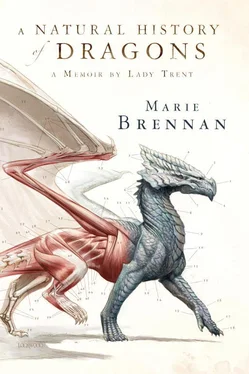I am also grateful for his assistance during our childhood years, exercising a boy’s privileges on my behalf. When our father was out of town, Andrew would borrow books out of his study for my use. Texts I myself would never have been permitted thus found their way into my room, where I hid them between the mattresses and behind my wardrobe. My new maid had too great a terror of being found off her feet to agree to the old deal, but she was amenable to sweets, and so we settled on a new arrangement, and I read long into the night on more than one occasion.
The books he took on my behalf, of course, were nearly all of natural history. My horizons expanded from their winged beginnings to creatures of all kinds: mammals and fish, insects and reptiles, plants of a hundred sorts, for in those days our knowledge was still general enough that one person might be expected to familiarize himself (or in my case, herself) with the entire field.
Some of the books mentioned dragons. They never did so in more than passing asides, brief paragraphs that did little more than develop my appetite for information. In several places, however, I came across references to a particular work: Sir Richard Edgeworth’s A Natural History of Dragons . Carrigdon & Rudge were soon to be reprinting it, as I learned from their autumn catalogue; I risked a great deal by sneaking into my father’s study so as to leave that pamphlet open to the page announcing the reprint. It described A Natural History of Dragons as “the most indispensable reference on dragonkind available in our tongue”; surely that would be enough to entice my father’s eye.
My gamble paid off, for it was in the next delivery of books we received. I could not have it right away—Andrew would not borrow anything our father had yet to read—and I nearly went mad with waiting. Early in winter, though, Andrew passed me the book in a corridor, saying, “He finished it yesterday. Don’t let anyone see you with it.”
I was on my way to the parlor for my weekly lesson on the pianoforte, and if I went back up to my room I would be late. Instead I hurried onward, and concealed the book under a cushion mere heartbeats before my teacher entered. I gave him my best curtsy, and thereafter struggled mightily not to look toward the divan, from which I could feel the unread book taunting me. (I would say my playing suffered from the distraction, but it is difficult for something so dire to grow worse. Although I appreciate music, to this day I could not carry a tune if you tied it around my wrist for safekeeping.)
Once I escaped from my lesson, I began in on the book straightaway, and hardly paused except to hide it when necessary. I imagine it is not so well-known today as it was then, having been supplanted by other, more complete works, so it may be difficult for my readers to imagine how wondrous it seemed to me at the time. Edgeworth’s identifying criteria for “true dragons” were a useful starting point for many of us, and his listing of qualifying species is all the more impressive for having been assembled through correspondence with missionaries and traders, rather than through firsthand observation. He also addressed the issue of “lesser dragonkind,” namely, those creatures such as wyverns which failed one criterion or another, yet appeared (by the theories of the period) to be branches of the same family tree.
The influence this book had upon me may be expressed by saying that I read it straight through four times, for once was certainly not enough. Just as some girl-children of that age go mad for horses and equestrian pursuits, so did I become dragon-mad. That phrase described me well, for it led not only to the premier focus of my adult life (which has included more than a few actions here and there that might be deemed deranged), but more directly to the action I engaged in shortly after my fourteenth birthday.
Blackmail — Reckless stupidity — An even more unfortunate incident with a wolf-drake — The near loss of off-the-shoulder dresses
We knew disgracefully little of dragons in those days, as there were no true dragons in Scirland, and the field of natural history was only beginning to turn its attentions abroad. I was very conversant, though, with the available information on those lesser cousins of dragons which may still be found in our own lands, and no command nor sum of money could have persuaded me to pass up an opportunity to learn more firsthand.
So when word came that a wolf-drake had been sighted on our property, not once but several times, by several different witnesses, and that it had been savaging sheep, you may well imagine how my interest soared. The name, of course, is a fanciful one; there is nothing wolflike about them, save their tendency to view livestock as their rightful meal. They are scarce in Scirland now, and were not abundant then; no one had sighted one in our region for a generation.
How could I forgo the chance?
First, however, I had to contrive a way to see the beast. Papa immediately set about organizing a hunt, just as he would have for a wolf that made a nuisance of itself. Had I asked for permission to ride along, though—as Andrew did, without success—I would absolutely have been denied. I had enough sense to realize that riding out on my own in hopes of sighting the wolf-drake would be fruitless, and highly dangerous if it were not; gaining my desire, therefore, would require more serious effort.
Credit—or perhaps blame—for what followed belongs at least in part to one Amanda Lewis, whose family were our nearest neighbors during my youth. My father and Mr. Lewis were good friends, but the same could not be said of my mother and Mrs. Lewis, and this created a degree of tension whenever social occasions threw us together—especially given Mama’s disapproval of their daughter.
Amanda was one year my senior, and the only girl of near age and equal status anywhere in the Tam River Valley. To my mother’s unending distress, she was also what young people nowadays would call wing —very improper in what Amanda thought to be fashionable ways. (I have never been wing; my impropriety has always been decidedly unfashionable.) But as I had no one else with whom to socialize, Mama could hardly forbid me to visit the Lewises, and so Amanda was my closest friend until marriage took us both away.
On the day we learned of the wolf-drake, I walked two miles to her house to share the news, and my situation immediately fired her fruitful imagination. Clutching a book to her chest, Amanda drew in a delighted breath and said, eyes sparkling with mischief, “Oh, but it is easy ! You must dress yourself as a boy and ride with them!”
Lest it be thought that I slander the name of my childhood friend by laying this incident at her feet, I must assure you that I, not she, was the one who found a way to put her idea into practice. This has often been the way with me: notions too mad for another to take seriously are the very notions I seize upon and enact, often in the most organized and sensible fashion. (I say this not out of pride, for it is a very stupid habit that has nearly gotten me killed more than once, but out of honesty. If you do not understand what my husband has called my deranged practicality, very little of my life will make the slightest bit of sense.)
So Manda’s declaration was the spark; the tinder and kindling which built it into a blaze were entirely my doing. It went thusly.
There were a number of lads who did odd jobs around our estate, mostly out of doors. I was not generally on close terms with these, but there was one, Jim, over whom I had a hold. Specifically, I had once come upon him in highly compromising circumstances with one of our downstairs maids. I myself had been on my way to hide a small and fascinating skull I could not identify, but as I had it concealed in my skirts, Jim did not know my own compromising circumstances. He therefore owed me a favor, and I determined that now was the time to redeem it.
Читать дальше












